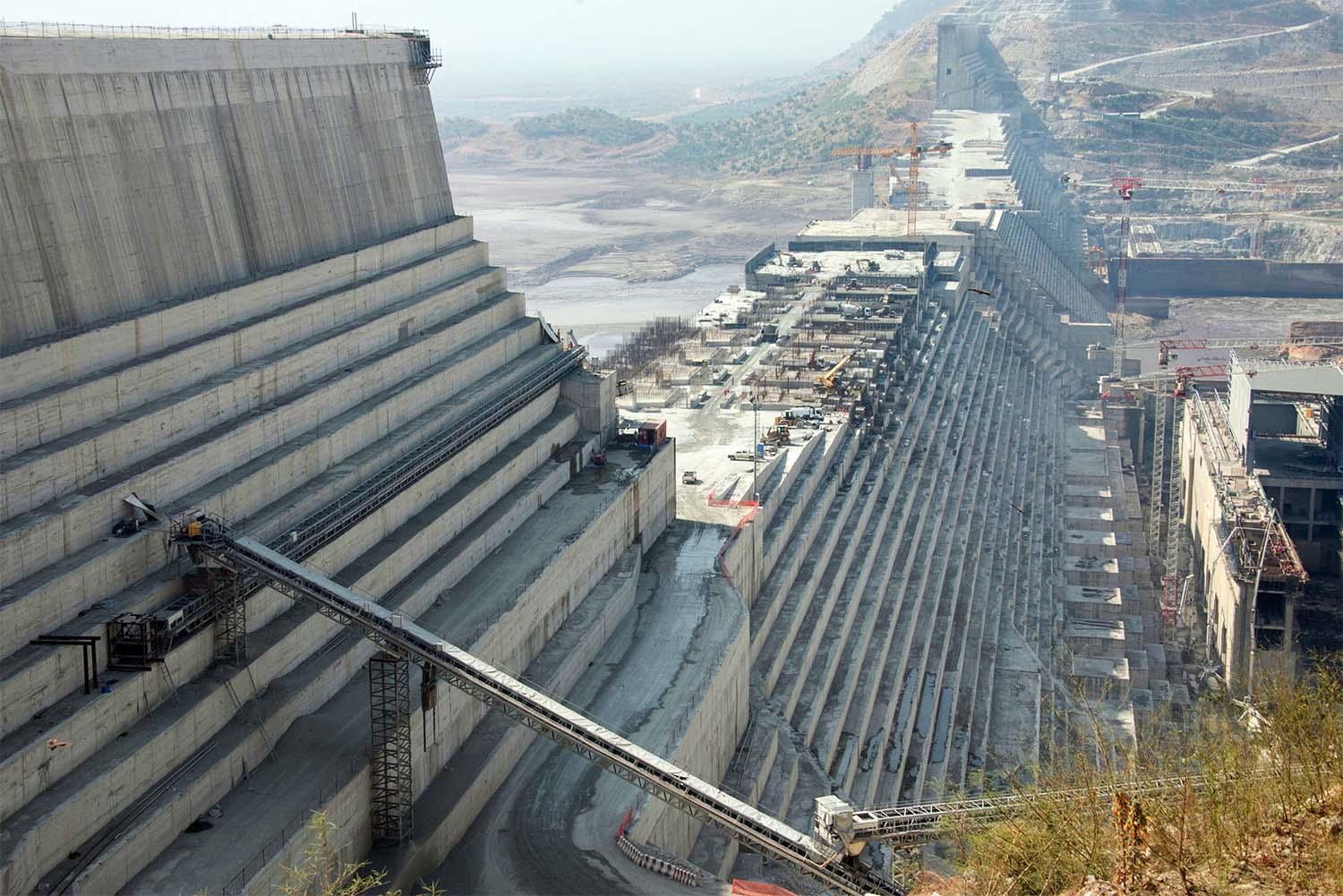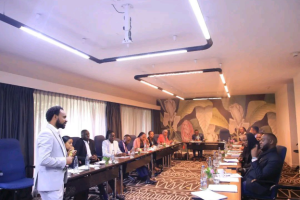
BY MULUGETA GUDETA
There is in the fate of the Nile something akin to the Greek myth of Sisyphus who was condemned by the gods to push a boulder up a steep hill until the end of his life. The myth of the Nile, if we may be allowed to call it thus, was a condemnation against the river to empty its contents either into the sea or into the desert lands of neighboring countries for eternity while impoverishing the land of its ancestors. This was exactly what the Nile was condemned to do until recently when the gods of its ancestors apparently rebelled against the myth and allowed the Nile the opportunity for redemption. And the Nile could shed its mythic past and enter the realm of earthly reality.
They say that great ideas find expression when their time for realization comes. The great idea of building a dam on the Ethiopian side of the Nile was conceived a long time ago, not in the mind of one person but in the womb of history. First it was an amorphous idea without well-defined contours. Then it evolved into an idea with clear objectives. And last but not least, it became an idea ready to be translated into reality. This process took not months or years but decades if not centuries. The Nile continued its journey along its millennial path, crossing the great landscapes of its birthplace, voyaging beyond national borders and pouring into the sea as it had been doing from times immemorial.
Meanwhile, historians continued to register its adventures, poets wrote epic poems and called it the longest river in the world that fed the hopes and dreams of hundreds of millions of people without however realizing it in its land of birth. It turned deserts into blooming farmlands, turned the turbines of power stations from Sudan to Egypt, formed a vast lake that is crisscrossed by boats, abundant with fisheries and feeding great irrigation projects.
It carried the fertile soils form Ethiopian highlands and gave it as a gift to our neighbors who never felt grateful for its generosity. Meanwhile, poor peasants in Ethiopia were visited by Biblical famines that claimed millions of lives while their counterparts in neighboring countries enjoyed bumper harvests and built great civilizations on the banks of the great Nile. Death and life continued to coexist until the time paupers the famished land said enough was enough.
Governments changed, revolutions took place and generations came and went but the Nile remained the same never changing its course. In its land of origin, the Nile was always treated like a beloved friend who leaves his home never to return again. It was celebrated and remembered with songs, poems, grudge, anger and at last hope. The 20th century left its place to the 21st and the Nile continued its silent journey. Everything changes, said Greek philosopher Heraclitus and you cannot cross a river twice according to his reasoning.
No force on earth could stop the Nile from flowing along its natural course, but there was what is called human determination that forced it to bend to human needs. The cup was full and the decades old dream about putting the Nile in the service of the poor and the righteous on its very birthplace started to turn from an amorphous notion into a tangible reality. This was made possible not by ‘extraordinary’ personalities but thanks to the collective will and collective determination of tens of millions of people who rose in unison to deal with the historic injustice that turned them into paupers while they should claim their rightful share from a legendary river that found life in the bosoms of their land.
This was perhaps the greatest turning point in the history of the Nile and a country called Ethiopia, “the land of people with burnt face” as the ancient Greeks called it. And when the people of a country rise to change history with a common purpose, there is no force on earth that could stand on their way. Yet, before turning the last page, the story of the Nile had to cross one last hurdle.
Like the birth of any great historical event, the birth of the Great Ethiopian Renaissance Dam (GERD) too was not only painful but also time consuming and complex. The Dam was born with great pomp but its construction took a perilous course while its historic opponents or detractors started to weave a complex web plots after plots in their bid to nip the dam in its bud or enrich themselves at its cost as the top brasses of the now authorities tried to do.
Judging from what had been done to the GERD by the old ruling clique, the Nile had had not only foreign detractors. Initially, the destiny of the dam fell in the wrong hands that abused it at will as if they were the magicians who made it possible or the masters who managed as if it were their private property. They usurped the Ethiopian people’s rightful and collective ownership of the dam and at last proved wrong as history dealt a final blow to their boundless appetite for power and wealth.
Billions of dollars were turned from the dam and filled the pockets of some of the most voracious corrupt officials who took the responsibility of managing the dam not form any other authority than the tens of millions of impoverished the people who paid with their sweat, their passion and their times to write history with their own labors. The previous authorities not only abused their trust but also arrogantly disregarded the mandate they were given by the very people to whom the dam genuinely belongs. By doing so, they lost the trust of the people and the consequences were tragic for them.
The mass protests and demands for change that erupted three years ago were thus targeted against the top brass of old ruling clique that was dreaming to build castles in the air while the people starved, died and suffered the consequences of their misrule. If reforms are well-managed, they are like revolutions that take place at far lower costs. Revolutions almost always destroy everything like popular tsunamis and force the same people to reclaim what has been destroyed by them, a task that often proved impossible of not costly. Well-calibrated reforms usually do the two jobs of correcting the past and reclaiming the present at the same time.
As far as the construction of the GERD was concerned, the reforms that were unleashed by the popular youth movements and the reformists within the system automatically put a halt to the lootings that were going on around the military-industrial conglomerate known as METEC where all the ugly elements of the system congregated to engage not in dam construction but in allegedly grand corruption.
If a reform process is genuine at all, its job is not only to unravel the past but to come up with a constructive alternative to redeem the present. The first item on the agenda of the reformist administration with regards the GERD was thus to cut the chains of corruption by getting rid of the corrupters and the instruments of corruption. And this was done swiftly so much so that construction on the GERD did not stop even for a minute.
All this was not done by some extraordinary people who have some extraordinary or supernatural powers to right the wrongs but by the entire Ethiopian people who were behind the project from day one and continued to pay whatever price it might take to make their age-old dreams come true. What the reformist transitional government has done is to articulate the wishes and aspirations of the people or give shape and life to their dream.
Billions were spent in order to put the construction of the dam back on track. Those who abused the people’s trust were questioned and some of them were even apprehended. As the reform was busy looking forward instead of backward, the popular enthusiasm that was thus unleashed made Ethiopians, both at home and in the Diaspora, all the more determined to continue the work of a generation they started ten years ago.
The challenge to the GERD was not only internal. There were also, and still are, external forces bent on undermining the people’s dream. They mistakenly look at the GERD as a product of some mistaken diplomacy or miscalculation on their part. That was not true. If they made a mistake it was their tendency to stop something unstoppable because it belongs to the entire Ethiopian people and to their nation. The GERD is not primarily a game of diplomacy as we know it. Above all, it is a moral contest between who is right and who is wrong. It is a fight between good against evil.
Standing on the way of more than 110 million people who want to get out of poverty by using their natural and God-given resources without infringing upon the rights of their fellow Africans, is not only a moral poverty on the part of the detractors but also the highest form of greed that in turn takes the form envy and evil intent at a grand scale.
No force on earth can beat the people at their own game. Even open war cannot force the people to change their minds and submit to the will of the regional league of evil doers. Those who invade territories that do not belong to them and resources that belong to all of the people of the region are politically bankrupt and arrogant tyrants. These forces do not wish even their own people anything good. They rather contemplate nightmarish scenarios to demonstrate or realize their delusion of grandeur and their plan to usurp the rights of their peoples by turning their attention to something that is sheer madness.
These forces are engaged in a kind of “myth of tyranny” and are condemned by history to be caught in an vicious cycle of torment, sowing discord among their peaceful neighbors and causing the wrath of the gods until another group of tyrants takes over them. The difference between the myth of the tyrants and the myth of the Nile is that the former are condemned to leave the scene when their time comes, while the Nile is reclaimed by the gods to serve the land of its ancestors. Three years of reforms giving more life to ten years of GERD: this is how the second chapter of the Nile story is written, for now. The third chapter will definitely be different if not more glorious that the preceding two because the history of the Nile is now being written by the people who build the GERD.
The Ethiopian Herald April 2/2021




